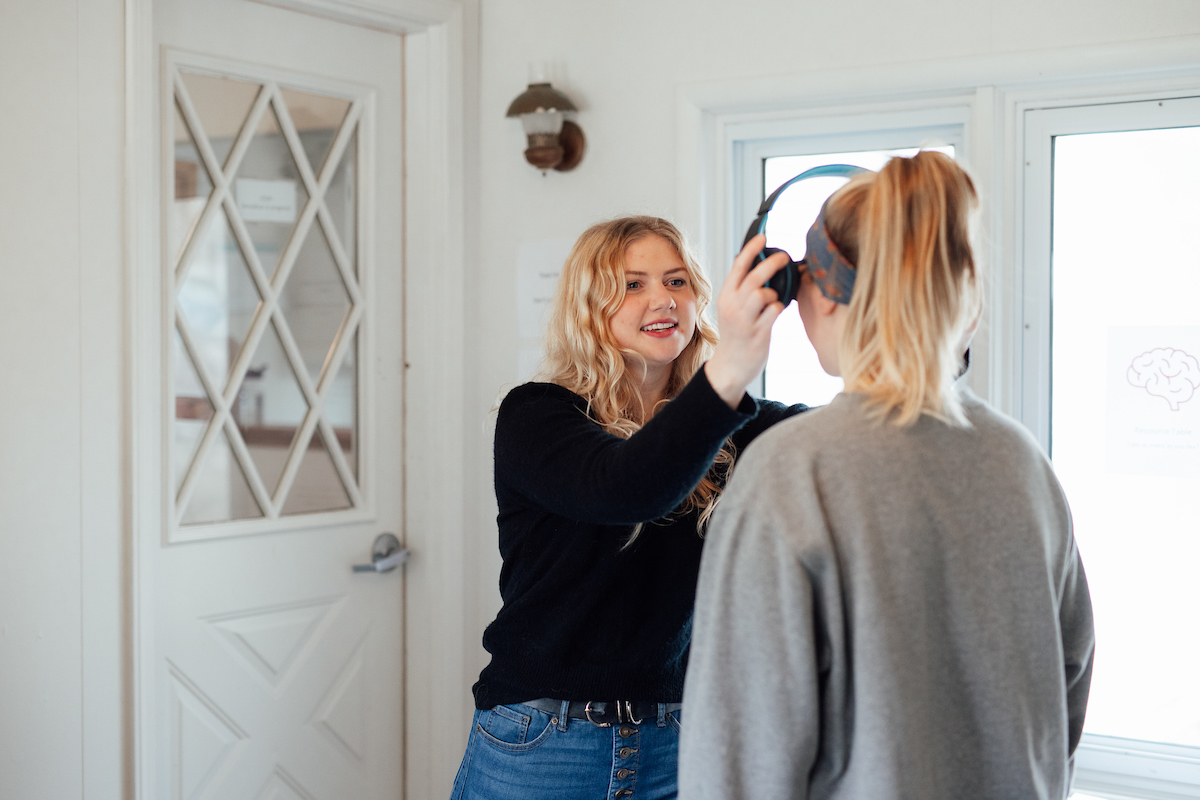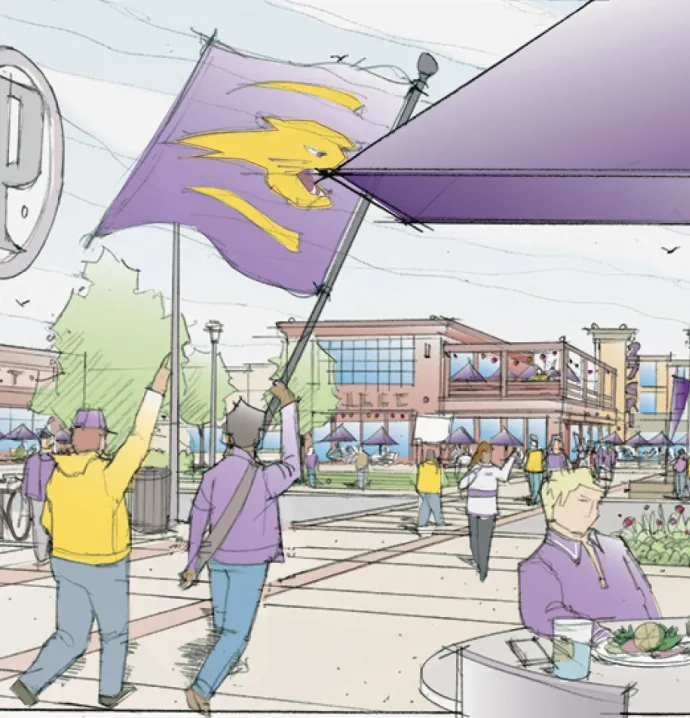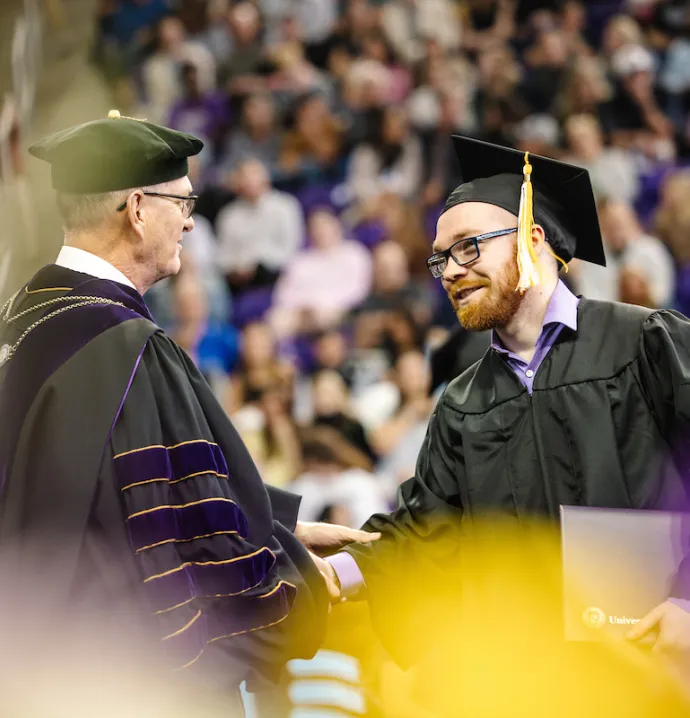Iowa’s only dementia simulation house, run by UNI gerontology, helps increase empathy
Iowa’s only dementia simulation house, run by UNI gerontology, helps increase empathy

From the outside, the small house on the side of the University of Northern Iowa campus may look completely ordinary. But on the inside, forces of UNI’s gerontology program and the Northeast Iowa Area Agency on Aging have united to bring the community an educational experience on what it’s like to live with dementia.
This dementia simulation house has been a passion project for Professor of Gerontology Elaine Eshbaugh who has been dreaming of starting a simulation on campus for years. While dementia simulations are fairly common, said Eshbaugh, they are usually more transportable, getting torn down and set up from one location to the next.
“My initial dream was to get two dorm rooms where we could do a simulation in one and a kind of debriefing in the other,” she said. “I thought that was the best I could do, and I would have been really excited with that. But, for me, the problem is that it kind of implies people with dementia live in just a room like in a hospital or a nursing home.”
Eshbaugh went on to say that 80% of people living with dementia live at home in the community, making the residential setting of this simulation more realistic. However, this is the only simulation that takes place in an entire house in Iowa, and Eshbaugh has never heard a simulation on this scale happening anywhere else.
Prior to the simulation’s opening in February, the community donated almost everything to furnish the home and, as Eshbaugh puts it, make it “appropriately cluttered.”
“Really, we don't want people to come in and say, ‘Oh, this looks like a dementia simulation house’,” she said. “We want people to come in and say, ‘Oh, this looks like my mom's house or my aunt’s house or the house I live in’.”
UNI’s gerontology program and the dementia simulation house have also benefited from a generous $100,000 gift from Scott and Lisa Soifer, a Charles City couple and 2003 UNI alumni who own several McDonald’s franchises throughout northeast Iowa.
“It resonated with me,” Lisa recalled of learning about the plans for the dementia simulation house. “I think as a society we often overlook gerontology issues, thinking ‘That's in the future, I don't have to do anything about it now.' Scott and I are very happy to support this worthy cause and great resource for professionals and caregivers.”
Because of the nature of the simulation, Eshbaugh doesn’t share with others what all takes place inside the house. When people come in, they are told they will live like a person with dementia. This starts with them putting on gloves, headphones and goggles, which disorient them and alter their senses. Beyond that, they don’t know anything about the experience.
Each session takes about 45 minutes, and up to four guests may go through at once. Eight weeks into the project, Eshbaugh said they are continuously full, bringing in 30 to 40 people each week.
“Running this house could easily be a full-time job, but I still have to do all the things I did before it opened,” she said.
At the end of the simulation, each participant is asked to capture the experience using a word or phrase on a piece of wood that’s shaped like a brain. All these wooden “brains” are collected in a jar that stays at the house. Some past simulation goers have written things like “noise,” “sense of loss,” “worried,” “dumb,” “overwhelming,” “slow” and “crazy.”
While there are many students studying gerontology, social work and psychology who are interested in the simulation, Eshbaugh said the participants have been diverse, including a range of ages and levels of experience with dementia.
“Sometimes we get someone in the community who just hears about us and says, ‘I like to learn. I really don't know anybody with dementia, but this sounded interesting’,” Eshbaugh said. “I love those people. Because really, this is about community. I want people with dementia to live and thrive in the community for as long as possible.”
While the dementia simulation is one way to become educated on dementia, it’s far from the only way, which is the focus of the work being done by Megan Zimmerman, ‘20. Zimmerman works for the Northeast Iowa Agency on Aging, a nonprofit organization coordinating services that help individuals maintain independence as they age.
Zimmerman is also a gerontology alum who chose to come to UNI because it has the only four-year gerontology program in the state. Now she coordinates a program called Dementia Friends Iowa which is available to anyone who wants to learn more about dementia including communication strategies and community resources.
Even before the house’s opening, Eshbaugh and Zimmerman had been working together on the Dementia Friendly Cedar Valley initiative to educate people on dementia. Using the house as another educational tool for people who are interested in becoming a Dementia Friend seemed like a natural fit, said Eshbaugh.
“People with dementia are directly and negatively impacted when people around them don't understand dementia,” Zimmerman explained. “So when you make sure that people understand dementia a little bit more and just some basics of how to communicate with someone with dementia, it really improves the quality of life for people with dementia.”
Zimmerman said there is no shortage of misconceptions when it comes to dementia, starting with the fact that dementia is more than memory loss. For example, it may impact someone’s motor skills and ability to focus, which the house helps simulate. She also said that people living with dementia have a lot to contribute to society.
“Some of our program's best volunteers are living with dementia,” Zimmerman said. “It's just so amazing and inspiring what they're doing. They're going out and educating the community. They're teaching so many people how to treat people with dementia and fundraising for these types of programs. They're still fully contributing to society, and I think that's been one of the most eye-opening things in my work.”
Another dementia simulation house affiliate who is utilizing the house as an educational tool is Eran Hanke, a licensed mental health counselor and the clinical coordinator of mental health counseling at UNI, who often collaborates with the gerontology program. She works to create resources both for people living with dementia and their caregivers.
“People come into the house very well-intentioned, curious and maybe a little bit fearful,” Hanke said. “They step in to experience dementia, even for a little while, and what they take away is really powerful.”
Hanke hopes that the house will not only increase empathy but also encourage people to take action — even in a small way — once they’ve completed the simulation.
“We don't require grand gestures to make life better for people,” she said.
If you would like to support the dementia simulation house and the gerontology program at UNI, you can donate here.




